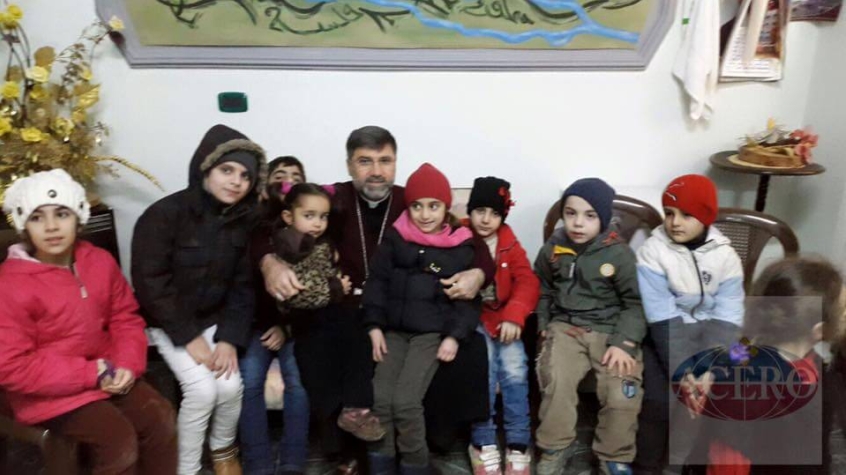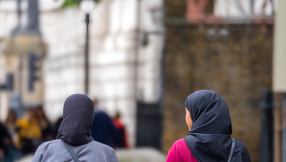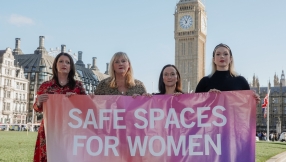
It was on February 23, 2015 that one of the largest groups of hostages to date in ISIS's war in Syria was captured. The hostages weren't just picked at random – the 226 victims were all Christians, seized from the Khabur River valley in northern Syria.
ISIS fighters attacked the 35 Christian villages in the region simultaneously, forcing inhabitants to destroy their religious icons and attempting to coerce them to recant their faith. Villagers ran for their lives, but over 200 of them were taken hostage. "There was no way you could resist," Abdo Mazra, one of the victims, told the Press Association.
The goal? To demand a hefty ransom for their safe release.
Over a year later, during which time ISIS killed three of the hostages, the rest of those taken were finally released – thanks in large part to one man.
Bishop Mar Afram Athneil was the first person to be given concrete details about the capture; he received a ransom note one week after the attack. The message demanded a payment of $50,000 per hostage – around $11 million in total – or they would all be killed.
It wasn't an easy decision – complying with terrorists and paying any kind of ransom is a highly controversial issue, with the latter actually illegal in the US and much of the Western world. However, with no details of where the hostages were and anxious to save as many lives as possible, there seemed little alternative but to try to raise the money.
Syrian-born filmmaker Sargon Saadi, who attempted to find out what had happened to the hostages, told the Press Association: "We can't fight them, Assyrians don't have an army to go rescue them. They don't have SWAT teams, they don't have SEAL 6. The only option they have is to pay the ransom."
After consulting with the Church around the world, Bishop Athneil replied to ISIS three days later, agreeing to send them the money.
But how to raise such a sum? He knew he couldn't do it alone, so he appealed to Christians and Syrians around the globe – and the response was overwhelming.
Canadian Assyrians raised around $100,000 to help. Aneki Nissan, one of the key fundraisers, said: "You look at it from the moral side and I get it. If we give them money we're just feeding into it, and they're going to kill using that money."
However, he said that as a small community, they had to stick together. "Every Assyrian I know knows somebody that was either kidnapped or directly affected by the kidnapping," he said.
In the German town of Saarlouis, Charli Kanoun, an Assyrian entrepreneur who owns two restaurants, was moved by the hostages' plight. He decided to raise as much money as possible. "Everyone contributed," he said. "The church opened an account in Irbil, Iraq, and announced it on the internet so everyone can donate."
Meanwhile, in Australia, Nicholas al-Jeloo, a lecturer at the University of Melbourne, gave a presentation on the history of the Khabur at a local church and asked people to donate to free the hostages – two of whom were his cousins. He said: "For the Assyrians, the Khabur was one of their last cultural strongholds in a sea of hostility in the Middle East. If they didn't help these people, it was the end." More than 500 people gave money that night.
Social media also played a pivotal role, both in terms of raising money and providing a network for friends and families of hostages to support each other and share news of their loved ones.
With money steadily trickling in, ISIS started to release people. Two women in May. One man in June. Then 22 in August.
Just when the Assyrian community dared hope that the end might be in sight, a video was released in September 2015 showing three of the captured men being shot.
"When that happened, everybody went crazy and money started flying in from all over," said Mr Saadi. "Churches, Assyrians, non-Assyrians, just donating to the churches and funnelling it to the bishop."
In Canada, Mr Nissan organised a Christmas concert, managing to raise thousands more dollars.
He said: "We just kept giving and giving."
The Assyrians say no government stepped in to help the hostages or their families. Bishop Athneil was the only one speaking up and fighting for their release, and it was he who handled the delicate negotiations with ISIS.
In November 2015, 37 hostages were freed – and people continued to be released every few weeks into 2016.
Finally, on February 22, almost a year to the day since they had been taken, the last 43 captives were let go.
The full amount that was paid to ISIS in return for the hostages still isn't known – but many credit Bishop Athneil with saving hundreds of Christians' lives.
"This man should go down as a saint," said Mr Nissan. "The things that he's done, the sacrifices he's made to help these people – he's refusing to leave Syria until all his flock is secured."













